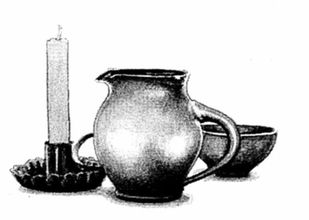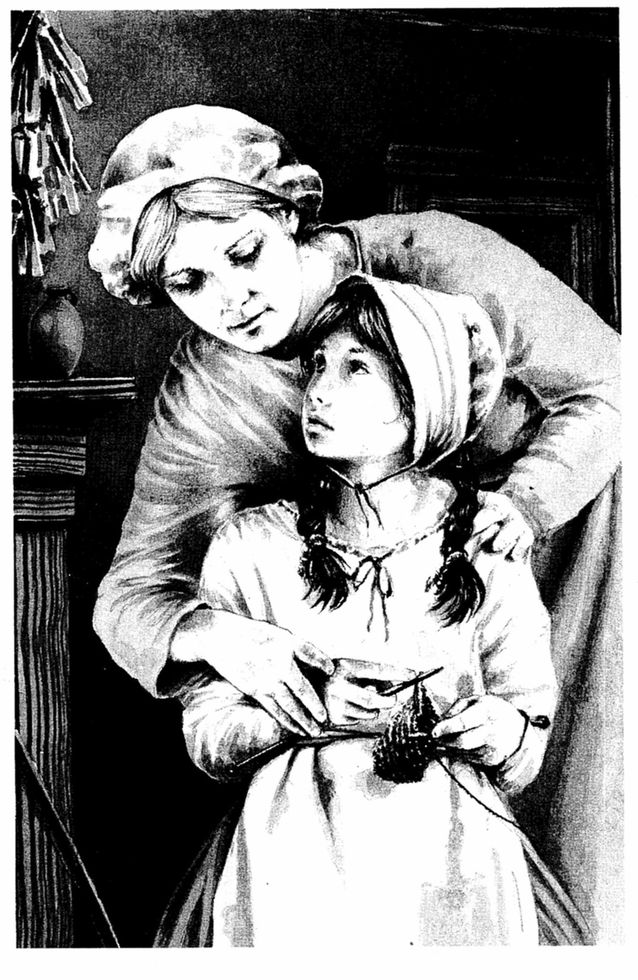Chapter 2
In the morning Ben found the first lamb half-buried in hay next to its mother. And then two more. Hannah ran out to the barn before breakfast to see them.
“They’re beautiful!” she exclaimed.
The lambs were standing on wobbly legs, nuzzling their mothers. It was amazing. These babies were just a few hours old. And already they were on their feet and looking around for their first meal. What did they think of this new world they found themselves in?
Hannah wished she could stay and watch all morning, but she had to help with breakfast. And after that it was time to work on her knitting.
In the daylight the mitten looked even worse. Like the work of a five-year-old, not someone soon to be nine. Patiently Mother took it out all the way to the thumb.
“You must pay attention to your stitches, Hannah,” she said as she handed back the mitten.
That was the problem, Hannah knew. Knitting was so much the same. Put the long needle in, wind the wool around it, take off the stitch. Do it all again. After a while she couldn’t help it. Her mind wandered away.
“I will try,” said Hannah. She did want to finish Ben’s mitten. And besides, she hated it when Mother looked at her the way she was now. Mother’s eyes were so serious, and a tiny frown puckered her forehead.
Mother never looked at Rebecca that way.
“You need to work harder at your needlework,” she said.
Mother was disappointed in her. It wasn’t just her knitting. Hannah had barely started her sampler, a piece of cloth that showed how many different stitches you could do. Rebecca had finished hers when she was seven. And Hannah’s friend Betsy Spooner was already halfway along. Mother had told Hannah how important it was for a girl to be able to hem and darn and turn a neat seam. But working those tiny stitches was so hard, and she was always pricking her finger.
Hannah straightened her shoulders.
“I will,” she promised. She would pay more attention. Her mind would not wander. And she would finish Ben’s mitten today.
It was a good day for needlework. A light rain pattered on the windows. Perhaps it would wash away the last of the March snow. Father had taken the younger boys with him to Mr. Spooner’s store. Ben was at the woodlot down the road. Mother and Rebecca were working, as they had almost all winter, on tents for General Washington’s army. Rebecca did the spinning, on the small flax wheel. Mother did the weaving, on the great square loom upstairs.
But this morning Mother was not at her loom. She sat winding the thread into long loops called skeins. It was quiet in the room. The only sounds were the click of Hannah’s needles, the whirr-sigh of the spinning wheel, and the tock-tock of the tall clock in the corner. It was the first one Father had ever made.
There was something peaceful about needlework, Hannah had to admit. Maybe that was why Mother liked it so much. As she worked, her face wore the smallest smile, one she didn’t even know she was smiling.
“By the end of the month,” Mother said, “I believe we will have finished one hundred and eighty yards.”
One hundred and eighty yards of tent cloth. That would make a lot of tents, Hannah thought. And then there were all the wool blankets and stockings and mittens that Mother and Rebecca had finished. Not one was for the family. Except for Hannah’s mittens for Ben, the Perley family was making do with what they had. Everything they made was for General Washington’s army.
It was the same with Father. He spent less time at his clock-making now and more in the fields, growing extra wheat and corn to feed the soldiers. Their neighbors were all planting more too. The town of Fairfield was proud of the way it was helping fight the British.
All of this had been going on almost as long as Hannah could remember. Ever since the April day two years ago, in 1775, when Ben had come running home to tell what he had seen on the village green.
“A horseman came galloping up to Thad deus Burr’s house,” he told them breathlessly, “and handed him a scroll. You should have seen his horse, dripping and puffing. He’d been riding three days from Boston to spread news of the fighting. Rode so hard the first day, his horse fell down dead.”
The fighting was at Lexington and Concord in Massachusetts. There, Ben said, British troops had fired on a small group of men.
Hannah had been full of questions. What was the fighting about? she asked. Why were we fighting the British? Weren’t we British too?
Father had explained.
“You’re right,” he said, smiling at her. “These lands were settled by Englishmen. But England has treated its American colonies badly. Always wanting more taxes, even on tea. That is why we don’t drink it anymore. And sending soldiers to watch over us. This fighting was bound to come.”
As soon as the tired horseman rode off to New York that April day, men began to gather on the village green. A few days later, nearly fifty soldiers marched off to Boston. Ben watched them go. Hannah saw him pull himself up tall, his feet stepping to the beat of the drums. From that moment on, Ben had longed to be one of them, a Patriot fighting against the British.
Father was such a strong Patriot himself. Why, Hannah wondered now, was he so set against Ben’s going?
“... And with Hannah’s help,” Mother said, “we will be able to do even more.”
Oh, dear. Hannah’s mind had wandered. Had she ruined her knitting again? She peered down at the mitten. No more mistakes that she could see. She breathed a sigh of relief. But Mother was looking at her.
“I’ve been thinking it is time for you to help with the spinning,” she said.
Hannah’s heart sank. That was something else she wasn’t good at. She had tried. But somehow she couldn’t get the feel of it.
“Don’t frown so, Hannah.” Rebecca smiled at her. “I will help you.”
Sometimes it was hard to remember that her sister was just thirteen. Already she seemed like a grown woman. And she looked just like Mother, small and neat with quick, gray eyes and pale yellow hair. Hair the color of flax. Hannah’s hair was the color of mud.
“It’s very simple really,” said Rebecca. She showed Hannah again how to press the foot treadle, the pedal that started the wheel spinning. How to wet her fingers in the water bowl. How, with her left hand, to draw out the fibers from the bundle of flax tied to the wheel. And, with her right hand, smooth it as it spun into thread.
“Slow down the wheel a little,” suggested Mother.
“And don’t let the flax twist too tight,” added Rebecca.
After watching a few minutes, they left her. Hannah could hear the squeak of chairs and the thump of the loom in the room above her head.
Pay attention. Keep the wheel going. She could do this, Hannah thought. Draw out the fibers with one hand. At the same time, smooth with the other.
At the same time. That was the problem. Hannah’s hands and feet seemed to belong to two different people. When she thought about the flax between her fingers, her foot stopped 16 rocking. And when she thought about her treadling, the flax twisted too tight.
Hannah stopped the wheel. She looked at the thread Rebecca had spun, so smooth and fine. And then at her own. Hers was all lumps and bumps.
Tears filled her eyes. She sat very still. No sounds came now from upstairs. All she could hear was the tock-tock of Father’s clock.
“You can’t do it,” it seemed to say. “You can’t do it.”


